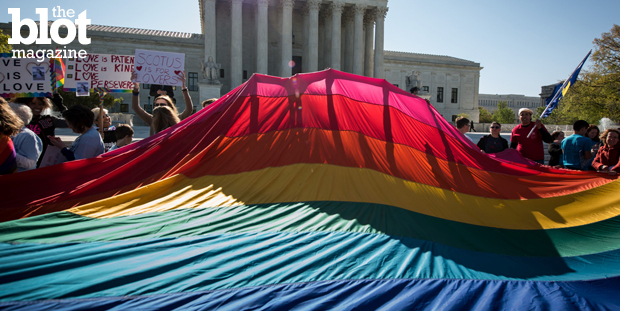My how far we have come.
The Supreme Court heard oral arguments on Tuesday, April 28 on what some consider the great civil rights issue of our day, same-sex marriage. In the four cases rolled up into Obergefell v. Hodges, all eyes were on Justice Anthony Kennedy. Considered the pivotal vote on this issue, he’s authored four major gay rights rulings in the past. Some saw much reason for hope in his questions, others were less optimistic. Nevertheless, the Supreme Court is no longer debating the if of gay marriage, but the how and when to pull the trigger on its national recognition.
But how did we get here? Let’s return for a moment to another April day in Washington, D.C., the April 25, 1993 March on Washington for Lesbian, Gay and Bi Equal Rights and Liberation. Close to 1 million LGBT Americans and their supporters gathered on the National Mall in protest. Here is the full list of demands the organizers of the march agreed upon:
- We demand passage of a lesbian, gay, bisexual, and transgender civil rights bill and an end to discrimination by state and federal governments including the military; repeal of all sodomy laws and other laws that criminalize private sexual expression between consenting adults.
- We demand massive increase in funding for AIDS education, research, and patient care; universal access to health care including alternative therapies; and an end to sexism in medical research and health care.
- We demand legislation to prevent discrimination against lesbians, gays, bisexuals and transgender people in the areas of family diversity, custody, adoption and foster care and that the definition of family includes the full diversity of all family structures.
- We demand full and equal inclusion of lesbians, gays, bisexuals and transgender people in the educational system, and inclusion of lesbian, gay, bisexual and transgender studies in multicultural curricula.
- We demand the right to reproductive freedom and choice, to control our own bodies, and an end to sexist discrimination.
- We demand an end to racial and ethnic discrimination in all forms.
- We demand an end to discrimination and violent oppression based on actual or perceived sexual orientation, identification, race, religion, identity, sex and gender expression, disability, age, class, AIDS/HIV infection.
Curiously, you’ll see that marriage is not even in the picture. Maybe it was seen as unimportant, maybe as a bridge too far. Other issues, still to be issues for LGBT community, are on the list. So once the marriage question is settled, an issue that by and large has consumed practically the entire movement as of late, where shall the LGBT community turn its attention to? Here are some ideas:
The International Cause
The constitutional guarantee known as full faith and credit is one of the major issues of the gay marriage debate. Meaning, if you were to marry in Massachusetts and then relocate to, say, Texas, the latter would have to recognize your contract. Texas is bad enough, but what about places like Iran, the Congo, even Russia? Many, many countries have appalling records of abuse toward its gay and lesbian citizens. Would it be fair or right for gay Americans, once the gay marriage ruling is out, to simply say, “Well, thanks, game over. We win. Good luck, everybody else.” President Obama’s record on calling out countries such as these is commendable, but much is left to do.
Transgender Rights
Let’s set the Bruce Jenner interview aside for a moment, shall we? His courage is real, but I remain somewhat skeptical given his comfortable position, not to mention his family’s history of shameless self-promotion. There are many, many transgender individuals whose struggle is far greater than his.
Youth Homelessness
Again, troubling. How we treat gay and lesbian kids is severely lacking.
A National Non-Discrimination in Employment and Housing
There is a map of 29 states where you can still be fired for being gay. Sadly, the shading of this map hasn’t changed much over the last few years. This issue is also the only thing mentioned here that is also squarely in the list of demands above. This is also arguably something that should have come before gay marriage, but we’ve had much success in the courts, not so much in Congress. Nevertheless, this battle has to be fought.
Again, LGBT rights have come so far, lightyears from where they stood when so many gathered on the National Mall nearly 22 years to the day when the Supreme Court heard the debate on marriage equality. But where to now? It’s time for us as a community to have that debate.
Brock Thompson is a contributing journalist for TheBlot Magazine.







One Comment
Leave a Reply